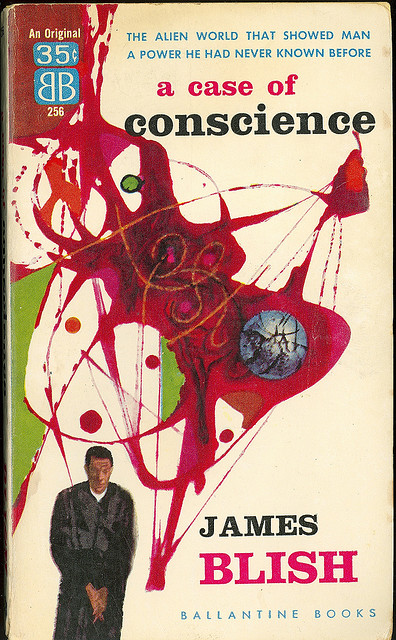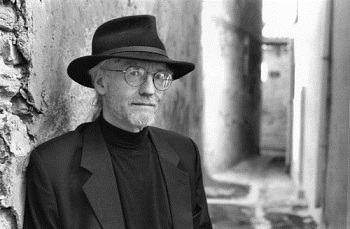James Morrow on A Case of Conscience
Egtverchi’s Wake: An Atheist Revisits A Case of Conscience
Like cabbages and kings, theology and science fiction are not normally mentioned in the same breath. It could scarcely be otherwise. Within the Roman Church and the Protestant denominations, doctrines emerge through a kind of sacralized dialectic informed by exegesis, prayer, and presumably inspired disputation. Science fiction, meanwhile, is keyed to what we know—and might eventually learn—about the physical universe through induction and experiment. A resolutely materialist-romantic literature, it either ignores supernatural explanations of reality or confines them to the psyches of pious secondary characters.
Braving the risk of narrative incoherence, a handful of writers during the previous century managed to give us novels that participate simultaneously in the medieval and the post-Enlightenment worldviews. Most of these works avoid self-contradiction by emphasizing metaphysical speculation over scientific and technological verisimilitude. Among Anglo-American efforts, one thinks immediately of David Lindsay’s A Voyage to Arcturus, Mary Doria Russell’s The Sparrow, C. S. Lewis’s interplanetary allegories, and perhaps parts of my own oeuvre.
In A Case of Conscience, James Blish employs a different strategy for having his Host and eating it too. By according the eschatological and the empirical equal weight, yet treating each in a manner at once rigorous and playful, he coaxes the two idioms into a kind of dynamic equilibrium. Strip away the offbeat apologetics from A Case of Conscience, and you get a fairly satisfying piece of worldbuilding cum sociological SF. To wit, a scientific research team charged with interpreting an Edenic planet, Lithia, fails to agree on whether it should become a UN protectorate. Complications both satiric and straight-faced ensue when one of the indigenous reptiloids, Egtverchi, reaches maturity on the Earth of 2050, subsequently wreaking havoc with the prevailing order—a civilization still reeling from its absurd overreaction to La Hideuse Époch of the nuclear arms race.
Of course, it would be as perverse to subtract the apologetics from A Case of Conscience as to delete Ahab’s obsession from Moby-Dick. For while Blish clearly intended his novel to feel like a work of hard SF, it is no less a work of hard theology. An agnostic with an omnivorous mind, the author astutely extrapolates from several core Christian dogmas and anathemas, bringing to his project the same level of erudition with which he delineates the geology and ecology of Lithia.
In particular, Blish builds on Manichaean dualism, spinning a delicious Gedanken experiment from the tenet that makes this heresy so heretical: its ascription of creatio ex nihilo powers—the ability to bring forth suns, planets, and sentient species—to Satan. As the first half of the novel unfolds, our protagonist, the compassionate Jesuit biologist-priest Ramon Ruiz-Sanchez, becomes transfixed by Mani’s scandalous understanding of evil. Lithia, he believes, is neither an authentic paradise nor an orbiting Potemkin village. It is nothing less than the Devil’s pied-à-terra-firma, designed and seeded by that selfsame fiend, the better to swindle humankind into believing that morality and harmony are possible in the absence of religion.
How seriously are we meant to take Father Ruiz-Sanchez as a theological thinker? His horrified—indeed, paranoid—reaction to Finnegans Wake, a text quoted anonymously on the first page of Blish’s novel, suggests that the priest’s intellect may itself be a Manichaean phenomenon. For better or worse, Ruiz-Sanchez is a man who would keep Finnegans Wake on the Index Expurgatorious because Joyce neglected to provide a pivotal sentence with a comma that would have allowed for an unambiguously Christian interpretation.
In presenting his protagonist’s eccentric and convoluted ruminations, Blish articulates conundrums that resonate as deeply today as they did in 1958. Is science a privileged and uniquely nonparochial mode of inquiry? Does our Judeo-Christian Weltanschauung provide both necessary and sufficient conditions for living an ethical life? Do we inhabit a teleological universe? (“This has been willed where what is willed must be,” says Ruiz-Sanchez, quoting Dante.) Is there a palpable principle of evil, and is it easily unmasked? (“He who would damn us often gives us gracefulness.”) Can we reconcile felix culpa theology and modern paleoanthropology by equating the pre-lapsarian with the pre-glacial? (“On Lithia the glaciers never came, and life continued to be spent in the paradise, as it was not allowed to do on Earth.”) Does human embryological development corroborate Darwin’s theory of descent with modification? (Blish may have been confused on this point, for he has his hero explain how post-Mendelian biologists embraced Haeckel’s dubious ontogeny-recapitulates-phylogeny argument, when in fact they were drawn to the opposite principle, neoteny.) Revisiting A Case of Conscience after an interval of perhaps thirty years, I was astonished to discover how many of our contemporary cultural clashes—evangelicals versus evolutionists, theocrats versus atheists, postmodern relativists versus scientific triumphalists—are prefigured in its pages.
As both a reader and a writer, I am chary of the current publishing practice whereby Book Group Discussion Questions are appended to the paperback reprints of novels and story collections. Such well-meant catalysts, I feel, traffic in an unintended reductionism, distracting us from the gestalt of the author’s achievement. When it comes to Blish’s novel, however, I would make a resounding exception. A Case of Conscience cries out for a study guide replete with provocations to heated discourse, for here is a book that, as art critic Peter Schjeldahl recently remarked in another context, “doesn’t tell us what to think, only what must be thought about.” In my penultimate paragraph I framed a half-dozen questions. Feel free to add your own. Let the conversation begin.




 Credit: Didier Leclerc, Atelier N89
Credit: Didier Leclerc, Atelier N89




